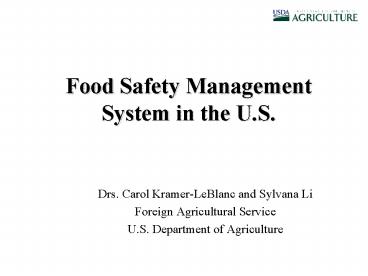Food Safety Management System in the U'S' PowerPoint PPT Presentation
1 / 14
Title: Food Safety Management System in the U'S'
1
Food Safety Management System in the U.S.
- Drs. Carol Kramer-LeBlanc and Sylvana Li
- Foreign Agricultural Service
- U.S. Department of Agriculture
2
U.S. Food Safety System
- Legal foundation U.S. Constitution
- Three branches of U.S. government carry out three
functions - Legislative (U.S. Congress, States) branch enacts
laws - Administrative (USDA, FDA, EPA, State Depts of
Ag.) branch implements laws - Judicial branch hears court cases
3
U.S. Food Safety Principles
- Foods must be safe wholesome to be marketed
- Regulatory decision making regarding safe food
should be science-based - Government has enforcement authority
- Process, manufacturers, distributors, importers
and others in the food marketing chain must
comply with laws and are liable if they dont - Regulatory process is transparent and accessible
to public
4
U.S. Laws Implementing Regulations on Food
Safety
- Federal Food, Drug Cosmetic Act (FFDCA) - Food
Drug Administration (FDA) - Federal Meat Inspection Act (FMIA) - USDA
- Poultry Products Inspection Act (PPIA) - USDA
- Egg Products Inspection Act (PPIA) - USDA
- Food Quality Protection Act (FQPA) - U.S.
Environmental Protection Agency (USEPA) - Public Health Services Act
5
U.S. Laws Procedural Statutes
- Administrative Procedures Act (requirements for
rule-making) - Federal Advisory Committee Act (balanced advisory
group) - Freedom of Information Act (publics right to
access information from agencies)
6
Characteristics of U.S. Rule Making
- US food safety programs aspire to be risk-based
- Regulations science-based
- Regulatory process transparent
- Stakeholder input encouraged through notice and
comment rule making - Also,
- Advisory committees
- Public meeting
7
Administrative Branch Agencies Their Major
Responsibilities Regulatory
- Department of Health Human Services (DHHS),
especially the FDA - Responsibility for most
foods, especially processed - USDA, especially the Food Safety Inspection
Service (FSIS) - Responsibility for meat, egg
poultry products - and USDA, Animal Plant Health Inspection
Service (APHIS) - Responsibility for animal and
plant health - USEPA - Responsibility for pesticide registration
and animal drugs
8
Administrative Branch Agencies Their Major
Responsibilities Monitoring Research
- DHHS, Centers for Disease Control and Prevention
(CDC) Public health monitoring, epidemiology - DHHS, National Institutes of Health (NIH)
research - USDA, Agricultural Research Service (ARS)
research - USDA, Cooperative State Research Education and
Extension Service (CSREES) research, education,
extension outreach - USDA, Economic Research Service (ERS)
regulatory impact analysis, costs of food-borne
illness
9
Administrative Branch Agencies Their Major
Responsibilities Monitoring Research, contd
- USDA, Agricultural Marketing Service (AMS)
- Economic grades standards (not safety)
- National Organics standards
- USDA, Grain Inspection, Packers and Stockyard
Administration (GIPSA) - Grain and livestock marketing (not safety)
- Department of Commerce, National Marine Fisheries
Service (NMFS) - Seafood marketing
10
U.S. Government International Activities
- USDA, Foreign Agricultural Service (FAS),
International Cooperation Development (ICD) - Collaborative research, technical assistance,
training - USDA, FAS, International Trade Policy (ITP)
- International trade negotiations
- USDA, Codex Office
- Works with Codex Alimentarius Commission and
member countries - Office of the U.S. Trade Representative
- International trade negotiations
- U.S. Department of State
- Foreign policy
11
Major Categories of Food Safety Hazards
- Pathogenic microorganisms
- Pesticide residues
- Animal drug residues
- Irradiation
- Myco toxins
- Heavy metals other chemical contaminants
- Illegal food additives
12
U.S. Approach Precaution
- Risk analysis
- Risk assessment
- - Hazard ID
- - Hazard characterization
- - Exposure assessment
13
U.S. Approach Precaution, contd
- Risk management
- e.g. - HAACP (Hazard Analysis and Critical
Control Point) - Risk communication
- Precaution - pre market approval
14
- Thanks

